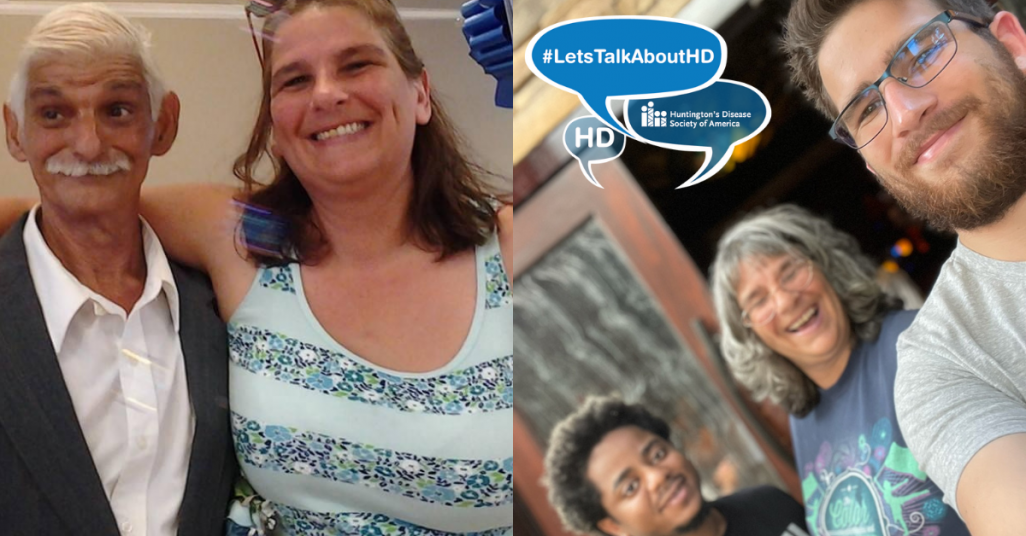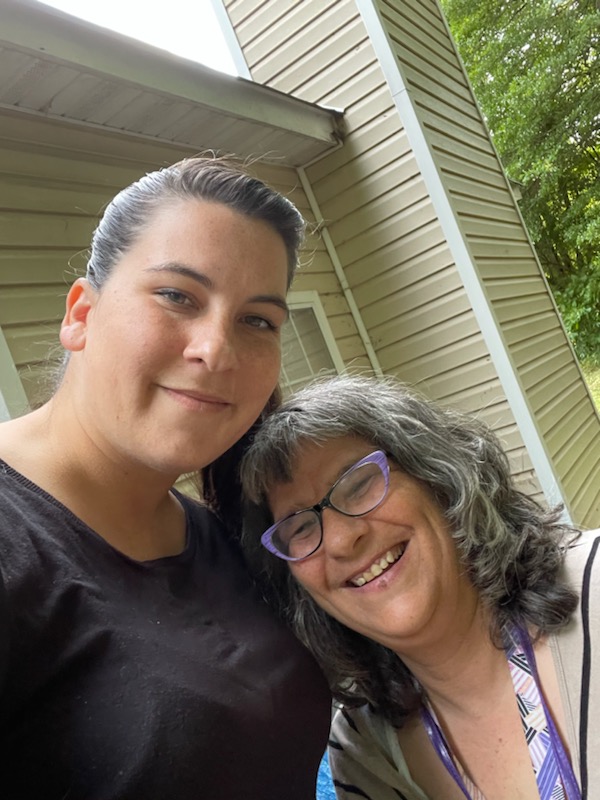
By Matthew Santamaria (msantamaria@hdsa.org)
In 2006, Georgia resident Vera Servello noticed that her mother started to experience involuntary movements. At first, she thought her mother was developing symptoms of Parkinson’s disease, a progressive nervous system disorder that affects movement.
However, her mother had Huntington’s disease (HD), a fatal genetic disorder that causes the progressive breakdown of nerve cells in the brain. It deteriorates a person’s physical and mental abilities during their prime working years and has no cure.
The decision to get genetically tested is difficult to make. Each year, 5-10% are tested. It is never the right or wrong decision to be tested. Some people see no benefit in knowing that they will develop the disease while others want to know to make informed choices about their future. It can take up to several weeks to receive your results from the genetic testing center.
After the positive diagnosis, Vera looked back at her childhood and did not notice any symptoms. Her mother was adopted and she did not know that she was at risk. Every child of a parent with HD has a 50/50 chance of inheriting the faulty gene.
According to Vera, her mother developed symptoms including mood swings and was later placed in a nursing home.
The symptoms of HD are described as having ALS, Parkinson’s, and Alzheimer’s – simultaneously. Symptoms include personality changes, mood swings, depression, forgetfulness, impaired judgment, unsteady gait, involuntary movements, slurred speech, difficulty in swallowing, and significant weight loss.
After an appointment with a neurologist, Vera went to Emory Hospital, one of the HDSA Centers of Excellence that provide an elite team approach to HD care and research. Professionals have extensive experience working with families affected by HD and work together to provide families with the best HD care program. Vera has praised Emory Hospital for their work for the HD Community.
In 2015, she had a blood test and it was revealed that she tested positive for the gene that causes HD. Vera also has a brother and her children that are still at risk.
Her daughter was studying to be a nurse and learned about HD. She is now a teacher. Her daughter was tested for HD and was negative. According to Vera, she was crying with joy that her daughter tested negative.
Vera has learned to live every day to the fullest and not to give up. She went to Capitol Hill in Washington to share her HD journey.
Applying for disability benefits is a necessity for most HD families, but the disability process is often complicated and overwhelming, whether it is a Social Security disability or a private disability. To learn more, click here
“Part of the difficulty with the disability process is having to come to terms with applying for disability,” said Allison Bartlett, HDSA’s Senior Manager of Disability Programs. “There is always fear and concern about the difficulty of the process and how long it will take, but there is also sadness. No one wants to be forced to stop working because of an illness. Every client I have had has said they would keep working if they could. It is okay to be sad and frustrated, that is part of the disability process, but remember that Social Security disability is a benefit that you pay into. If you need SSDI because of an HD diagnosis, you have earned that benefit and no one should feel bad about taking it.”
Without passage of the HD Parity Act, patients with HD will continue to suffer the mandated 2-year waiting period for Medicare benefits after qualifying for Social Security Disability Insurance. To learn more, click here
Vera is not going to let HD ruin her life and wants to focus on the positive aspects of her life.

Vera has a message for the HD Community:
“Be strong, do not let HD get you down. Be more vocal. We might be different but we are still people that need a cure for HD.”
###
Huntington’s disease (HD) is a fatal genetic disorder that causes the progressive breakdown of nerve cells in the brain. It deteriorates a person’s physical and mental abilities during their prime working years and has no cure. Every child of a parent with HD has a 50/50 chance of inheriting the faulty gene. Today, there are approximately 41,000 symptomatic Americans and more than 200,000 at-risk of inheriting the disease. The symptoms of HD are described as having ALS, Parkinson’s and Alzheimer’s – simultaneously.
The Huntington’s Disease Society of America is the premier nonprofit organization dedicated to improving the lives of everyone affected by HD. From community services and education to advocacy and research, HDSA is the world’s leader in providing help for today and hope for tomorrow for people with HD and their families.
HDSA was founded in 1967 by Marjorie Guthrie, the wife of legendary folk singer Woody Guthrie. Woody died from HD complications when he was only 55 years old, but the Guthrie family legacy lives on at HDSA to this day.
To learn more about Huntington’s disease and the work of the Huntington’s Disease Society of America, visit www.HDSA.org or call 1(800)345-HDSA.
This is a story featuring a personal experience with Huntington’s disease. If you would like to have your story told please contact Matthew Santamaria at msantamaria@hdsa.org
In 2006, Georgia resident Vera Servello noticed that her mother started to experience involuntary movements. At first, she thought her mother was developing symptoms of Parkinson’s disease, a progressive nervous system disorder that affects movement.
However, her mother had Huntington’s disease (HD), a fatal genetic disorder that causes the progressive breakdown of nerve cells in the brain. It deteriorates a person’s physical and mental abilities during their prime working years and has no cure.
The decision to get genetically tested is difficult to make. Each year, 5-10% are tested. It is never the right or wrong decision to be tested. Some people see no benefit in knowing that they will develop the disease while others want to know to make informed choices about their future. It can take up to several weeks to receive your results from the genetic testing center.
After the positive diagnosis, Vera looked back at her childhood and did not notice any symptoms. Her mother was adopted and she did not know that she was at risk. Every child of a parent with HD has a 50/50 chance of inheriting the faulty gene.
According to Vera, her mother developed symptoms including mood swings and was later placed in a nursing home.
The symptoms of HD are described as having ALS, Parkinson’s, and Alzheimer’s – simultaneously. Symptoms include personality changes, mood swings, depression, forgetfulness, impaired judgment, unsteady gait, involuntary movements, slurred speech, difficulty in swallowing, and significant weight loss.
After an appointment with a neurologist, Vera went to Emory Hospital, one of the HDSA Centers of Excellence that provide an elite team approach to HD care and research. Professionals have extensive experience working with families affected by HD and work together to provide families with the best HD care program. Vera has praised Emory Hospital for their work for the HD Community.
In 2015, she had a blood test and it was revealed that she tested positive for the gene that causes HD. Vera also has a brother and her children that are still at risk.
Her daughter was studying to be a nurse and learned about HD. She is now a teacher. Her daughter was tested for HD and was negative. According to Vera, she was crying with joy that her daughter tested negative.
Vera has learned to live every day to the fullest and not to give up. She went to Capitol Hill in Washington to share her HD journey.
Applying for disability benefits is a necessity for most HD families, but the disability process is often complicated and overwhelming, whether it is a Social Security disability or a private disability. To learn more, click here
“Part of the difficulty with the disability process is having to come to terms with applying for disability,” said Allison Bartlett, HDSA’s Senior Manager of Disability Programs. “There is always fear and concern about the difficulty of the process and how long it will take, but there is also sadness. No one wants to be forced to stop working because of an illness. Every client I have had has said they would keep working if they could. It is okay to be sad and frustrated, that is part of the disability process, but remember that Social Security disability is a benefit that you pay into. If you need SSDI because of an HD diagnosis, you have earned that benefit and no one should feel bad about taking it.”
Without passage of the HD Parity Act, patients with HD will continue to suffer the mandated 2-year waiting period for Medicare benefits after qualifying for Social Security Disability Insurance. To learn more, click here
Vera is not going to let HD ruin her life and wants to focus on the positive aspects of her life.

Vera has a message for the HD Community:
“Be strong, do not let HD get you down. Be more vocal. We might be different but we are still people that need a cure for HD.”
###
Huntington’s disease (HD) is a fatal genetic disorder that causes the progressive breakdown of nerve cells in the brain. It deteriorates a person’s physical and mental abilities during their prime working years and has no cure. Every child of a parent with HD has a 50/50 chance of inheriting the faulty gene. Today, there are approximately 41,000 symptomatic Americans and more than 200,000 at-risk of inheriting the disease. The symptoms of HD are described as having ALS, Parkinson’s and Alzheimer’s – simultaneously.
The Huntington’s Disease Society of America is the premier nonprofit organization dedicated to improving the lives of everyone affected by HD. From community services and education to advocacy and research, HDSA is the world’s leader in providing help for today and hope for tomorrow for people with HD and their families.
HDSA was founded in 1967 by Marjorie Guthrie, the wife of legendary folk singer Woody Guthrie. Woody died from HD complications when he was only 55 years old, but the Guthrie family legacy lives on at HDSA to this day.
To learn more about Huntington’s disease and the work of the Huntington’s Disease Society of America, visit www.HDSA.org or call 1(800)345-HDSA.
This is a story featuring a personal experience with Huntington’s disease. If you would like to have your story told please contact Matthew Santamaria at msantamaria@hdsa.org
